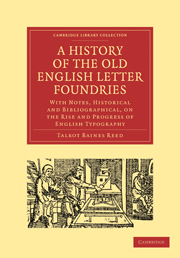 A History of the Old English Letter Foundries
A History of the Old English Letter Foundries Book contents
- Frontmatter
- PREFACE
- Contents
- LIST OF ILLUSTRATIONS
- Introductory Chapter: THE TYPES AND TYPE FOUNDING OF THE FIRST PRINTERS
- Chap. 1 THE ENGLISH TYPE BODIES AND FACES
- Chap. 2 THE LEARNED, FOREIGN AND PECULIAR CHARACTERS
- Chap. 3 THE PRINTER LETTER-FOUNDERS, FROM CAXTON TO DAY
- Chap. 4 LETTER FOUNDING AS AN ENGLISH MECHANICAL TRADE
- Chap. 5 THE STATE CONTROL OF ENGLISH LETTER FOUNDING
- Chap. 6 THE OXFORD UNIVERSITY FOUNDRY
- Chap. 7 THE STAR CHAMBER FOUNDERS, AND THE LONDON POLYGLOT
- Chap. 8 JOSEPH MOXON
- Chap. 9 THE LATER FOUNDERS OF THE 17TH CENTURY
- Chap. 10 THOMAS AND JOHN JAMES
- Chap. 11 WILLIAM CASLON
- Chap. 12 ALEXANDER WILSON
- Chap. 13 JOHN BASKERVILLE
- Chap. 14 THOMAS COTTRELL
- Chap. 15 JOSEPH AND EDMUND FRY
- Chap. 16 JOSEPH JACKSON
- Chap. 17 WILLIAM MARTIN
- Chap. 18 VINCENT FIGGINS
- Chap. 19 THE MINOR FOUNDERS OF THE 18TH CENTURY
- Chap. 20 WILLIAM MILLER
- Chap. 21 THE MINOR FOUNDERS FROM 1800 TO 1830
- CHRONOLOGICAL TABLE OF ENGLISH LETTER-FOUNDERS' SPECIMENS NOTED IN THIS WORK 1665–1830
- LIST OF THE PRINCIPAL AUTHORITIES CONSULTED OR REFERRED TO
- INDEX
- Plate section
Chap. 9 - THE LATER FOUNDERS OF THE 17TH CENTURY
Published online by Cambridge University Press: 05 August 2011
- Frontmatter
- PREFACE
- Contents
- LIST OF ILLUSTRATIONS
- Introductory Chapter: THE TYPES AND TYPE FOUNDING OF THE FIRST PRINTERS
- Chap. 1 THE ENGLISH TYPE BODIES AND FACES
- Chap. 2 THE LEARNED, FOREIGN AND PECULIAR CHARACTERS
- Chap. 3 THE PRINTER LETTER-FOUNDERS, FROM CAXTON TO DAY
- Chap. 4 LETTER FOUNDING AS AN ENGLISH MECHANICAL TRADE
- Chap. 5 THE STATE CONTROL OF ENGLISH LETTER FOUNDING
- Chap. 6 THE OXFORD UNIVERSITY FOUNDRY
- Chap. 7 THE STAR CHAMBER FOUNDERS, AND THE LONDON POLYGLOT
- Chap. 8 JOSEPH MOXON
- Chap. 9 THE LATER FOUNDERS OF THE 17TH CENTURY
- Chap. 10 THOMAS AND JOHN JAMES
- Chap. 11 WILLIAM CASLON
- Chap. 12 ALEXANDER WILSON
- Chap. 13 JOHN BASKERVILLE
- Chap. 14 THOMAS COTTRELL
- Chap. 15 JOSEPH AND EDMUND FRY
- Chap. 16 JOSEPH JACKSON
- Chap. 17 WILLIAM MARTIN
- Chap. 18 VINCENT FIGGINS
- Chap. 19 THE MINOR FOUNDERS OF THE 18TH CENTURY
- Chap. 20 WILLIAM MILLER
- Chap. 21 THE MINOR FOUNDERS FROM 1800 TO 1830
- CHRONOLOGICAL TABLE OF ENGLISH LETTER-FOUNDERS' SPECIMENS NOTED IN THIS WORK 1665–1830
- LIST OF THE PRINCIPAL AUTHORITIES CONSULTED OR REFERRED TO
- INDEX
- Plate section
Summary
THOMAS GORING, 1668.
JOSEPH LEE, 1669
Of these two founders nothing is known beyond what is recorded in two short entries on the books of the Stationers' Company, viz.:—
1668. The Master and Wardens requested to certify to the Archbishop of Canterbury that Thomas Goring, a member of this Company, is an honest and sufficient man, and fit to be one of the four present founders; there being one now wanting, according to the Act of Parliament.
1669. Mr. Joseph Lee and Mr. Goring to give at the next Court an account in writing, what sorts of letter they have made, and for whom, since the Act of Parliament in that case was provided.
The names of both these founders occur in the list, already referred to, of former Stewards of the Brotherly Meeting of Masters and Workmen Printers, issued in 1681.
ROBERT ANDREWS, 1683
This founder, who was born in 1650, succeeded Joseph Moxon, probably about the year 1683, and transferred his foundry to Charterhouse Street, where he continued in business till 1733. His foundry, of which, Mores informs us, Moxon's matrices formed the most considerable part, was, next to that of the Grovers, the most extensive of its day; and it would appear that, for some time at any rate, these two shared between them the whole of the English trade. Andrews' foundry consisted of a large variety of Roman letter and Titlings; and in “learned” founts was specially rich in Hebrew, of which there were no less than eleven founts, and five Rabbinical.
- Type
- Chapter
- Information
- A History of the Old English Letter FoundriesWith Notes, Historical and Bibliographical, on the Rise and Progress of English Typography, pp. 193 - 211Publisher: Cambridge University PressPrint publication year: 2010First published in: 1887


